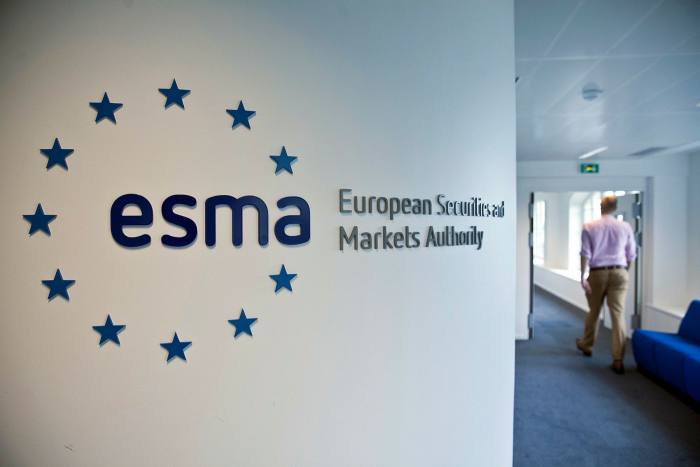Tanks, rifles and trenches seem to be unavoidable in the news these days. The Ukraine conflict has governments around the world on edge — and European economies at risk.
But one piece of military news this week offers a bit of promise for the climate. The US Army published an unprecedented climate strategy. In it, the army adopted a “Buy Clean” policy for its giant budget for buying construction materials with lower embodied carbon emissions. This will help the army reach net-zero carbon emissions for procurements by 2050.
In today’s edition, environmental, social and governance (ESG) investing and short selling are clashing again with the Securities and Exchange Commission, which has rules for securities lending transparency on the agenda. Simon Mundy has an interview with the new head of the Global Reporting Initiative. And check out how boards are taking ESG more seriously. Patrick Temple-West
ESG and short selling: asset managers seek a path ahead amid tensions
The practice of securities lending is coming up again as an ESG issue.
Renewable energy companies, which have suffered a reversal of fortunes in recent months, have seen short sellers take aim at green stocks. Vestas and Nordex, two European wind turbine manufacturers, have drawn new short interest from hedge funds.
Allbirds, a sustainability darling that went public last year, has seen its short interest jump this year and is one of the most heavily shorted US stocks. Short interest in Beyond Meat, another sustainability winner, has doubled from a year ago.
These new short positions have emerged as the US justice department digs into what some of the best-known short sellers are up to.
Asset managers earn hundreds of millions of dollars in interest by lending shares to short sellers. But these revenues put asset managers in awkward spots when they promote themselves as sustainable business champions.
You may remember that short selling previously emerged as an ESG concern when Japan’s Government Pension Investment Fund in 2019 halted securities lending, arguing that it was antithetical to long-term, sustainable investing. The pension fund was primarily concerned that when asset managers lend away shares, they lose their ability to vote at annual meetings — depriving them of the necessary steering that ESG engagement requires.
Asset managers and short sellers organised a new set of standards — the Global Principles for Sustainable Securities Lending (PSSL) — to harmonise short selling with ESG.
BlackRock in December published its own policy. Notably, BlackRock said only about 8 per cent of its portfolios were lent out. Of these shares, in certain instances, BlackRock will recall shares to vote. This situation came up with Telecom Italia in 2018 when BlackRock restricted lending across its fund to vote in a proxy contest.
Global regulators, such as the Financial Stability Board, could help develop transparency standards for securities lending, said Radek Stech, head of the PSSL and a senior lecturer at the University of Exeter Law School. “Improving overall governance around securities lending could lead to increased transparency in the US and global markets,” he said in a January letter to the SEC, which has proposed new disclosure rules for securities lending.
Voting has become a valuable cudgel for climate-conscious investors where turnout can be significant. Disclosures shedding light on when and how shares are lent out will become crucial in close contests over ESG shareholder proposals and director seats. Patrick Temple-West
Don’t miss this moment, says new GRI chief
Sustainability reporting has become a hot topic of late — but the Netherlands-based Global Reporting Initiative has been sweating away in this field for a quarter of a century.
Since its founding in 1997, the non-profit has attracted more than 10,000 global companies that use its framework to report their environmental and social impacts. Under new chief executive Eelco Van der Enden, a gregarious Dutchman who took the helm last month, its clout is set to grow still further — as it leads a European Commission-backed initiative to develop mandatory reporting standards for listed companies across the continent.
“Stakeholder capitalism makes no sense without data — without a reporting standard for stakeholders, for society,” Van der Enden told me on Thursday. Within about a month, he expects the publication of draft standards from the GRI and the European Financial Reporting Advisory Group. By 2023, if all goes to plan, reporting under these standards will be mandatory for most listed European companies. Van der Enden is hoping that regulators elsewhere will treat the standards as a benchmark, citing early interest from officials in Asia.
However, he was quick to distinguish the GRI’s approach from the mandate of the International Sustainability Standards Board, a new initiative announced during COP26 in November. Chaired by former Danone chief executive Emmanuel Faber, the ISSB is drawing up standards primarily for investors’ use; companies will be required to disclose sustainability-related matters that could affect their business value. In contrast, the GRI approach focuses on the effects that a company has on the environment and society at large. “Not everything should be driven by value creation,” Van der Enden said.
While he said there was a clear need for both types of reporting, Van der Enden said it would be vital for the ISSB and GRI to collaborate closely and achieve the best possible alignment of their standards, with common definitions of core concepts. Otherwise, he warned, the push for expanded corporate sustainability reporting risked being undermined by confusion and increased compliance costs. “It’s not about egos or whatever,” Van der Enden said. “This must succeed. If we’re not able to pull this through during the next two years, then I’m afraid we will miss a moment.”
Simon Mundy
Global regulators scrutinise ESG in credit ratings

This week, S&P Global announced $98mn of ESG-related revenue in 2021, up 51 per cent from the year before. The rating agency, which made money from green bond verification and other third-party sustainability opinions, promised 40 per cent compound annual growth for ESG going forward.
But the credit ratings’ ESG businesses are also coming under regulatory fire. On Thursday, the European Securities and Markets Authority (Esma) identified a “quite striking” range of what credit rating agencies (CRAs) consider ESG — or not. “It is unclear why some CRAs deem ESG factors to be relevant and report them in their press releases, while others do not yet do so,” Esma said, adding that “investors could benefit from further transparency in this area”.
Earlier on Friday Esma published a two-year road map for how it will fight greenwashing, including how to improve “transparency on the role of ESG factors in the credit rating process”.
The European action followed the Securities and Exchange Commission’s annual report on credit rating agencies. Usually a soporific report, this year’s analysis of credit rating firms identified “potential risk for conflicts of interest if [a ratings firm] offers ratings and non-ratings ESG products and services”.
Watch this space. S&P and the other credit rating firms need to keep up the ESG revenues to satisfy shareholders. But conflicts of interest have tripped up rating agencies before. Patrick Temple-West
Chart of the day

Most US directors expect that ESG reporting will face as much scrutiny as financial reporting within the next three years, according to a survey of board members’ expectations.
A similar majority foresees having to commit more time to their board roles, according to a National Association of Corporate Directors poll of 238 directors. The signs of changing governance norms add up to a “dramatic change in the operating environment” of corporate boards, the NACD concludes. Kristen Talman
Smart read
-
Tariq Fancy, BlackRock’s former chief investment officer for sustainable investing, grabbed attention last year with his warnings that ESG investing was a “giant societal placebo”. Now he’s back with an FT comment piece in which he takes aim at companies that talk about stakeholder capitalism, while resisting calls for transparency on their political spending.
l











